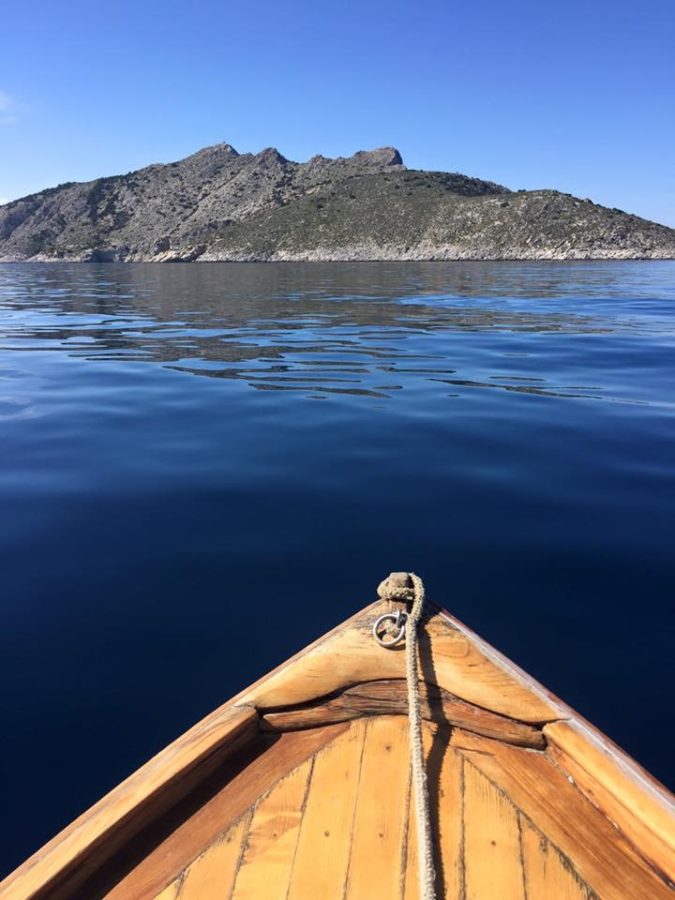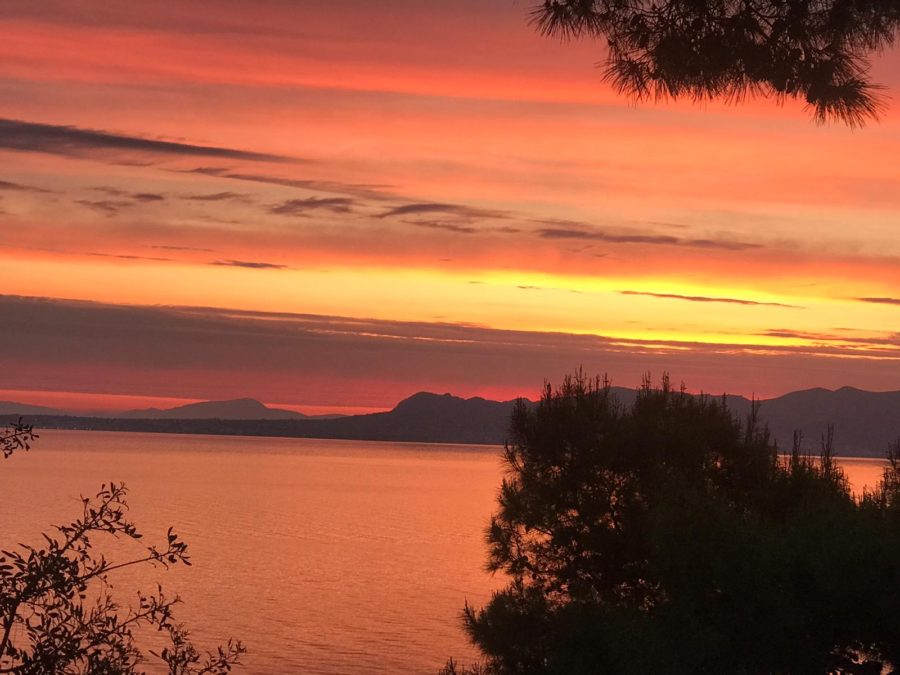Homer's Iliad on the Greek island of Agistri
Event Details
After three exhilarating trips to the beautiful island of Agistri on the Saronic Gulf to study Homer and Aeschylus, we plan
Event Details
After three exhilarating trips to the beautiful island of Agistri on the Saronic Gulf to study Homer and Aeschylus, we plan to return in 2024, this time to immerse ourselves in Homer’s Iliad.

“When I first ran studies of The Iliad, I had the great privilege of working with the sparkling Liane Aukin, who had directed the productions of Christopher Logue’s War Music, a modern re-telling of Homer’s great chronicle of rage and loss. Now we meet this epic again, this time in the moment of Emily Wilson’s new translation – eagerly anticipated after her Odyssey – bringing the ancient poem to modern readers as a fresh and vibrant work. “
Toby Brothers, Founding Director, The London Literary Salon
The Iliad and The Odyssey, the twin roots of classical epic literature, call to us across the ages. To truly understand where we are in our cultural development today, we must first know where we have come from: how our ideas around honour, community, justice, love, conflict and loyalty arise from the stories and lives of those who came before us. We have offered The Odyssey in many Salon studies previously: the heat of the work considered through our contemporary lens is fierce. We still grapple with the wavering line between cunning and deceit; the decision to sacrifice a few lives to save more; the modification of oaths sworn in war or love when unforeseeable circumstances exert their force.
The Iliad is about much more than the war fought between the two most powerful armies of the ancient world. To study the Iliad, it is necessary to confront the reality of war, in both the past and in the present, which is perhaps why Homer’s very modern sounding account does not make the Greeks the good guys and the Trojans the bad . . . the heroes are flawed, the battles remain murky and unresolved. The gorgeousness of the language lies in the cries for forgiveness, for honour of the dead, for the loss of loved ones, and how the quiet moments of life become exquisite in the face of loss.
In these studies we will focus on Emily Wilson’s wonderful new translation of The Iliad and this interview with Charlotte Higgins in the Guardian explains what makes it so fresh, rewarding and relevant to our times. Of course, The Iliad is first and foremost a book about war, and that is perhaps why I have avoided studying it previously. Today, I understand that the horror of war is not to be avoided; in fact, the choices in the moment of battle, the sacrifices and force of the moment are not someone else’s story, this is my story, this is everyone’s story. If I have the good fortune not to experience war in my immediate world, this is an illusion created by layers of privilege and technology; war happens now, and is still a terrible and authentic determinant of the human story. When I first wrote about this some years ago, I was in that privileged position of experiencing war only indirectly. Today, with my daughter working in Ukraine, providing humanitarian aid in the face of a war prompted by Russia’s invasion, I am no longer at that remove. I witness through her the way war clarifies choices and heightens all encounters.
In this book I am struck by how present the Greek gods and goddesses are: they argue, they interfere, they are wounded in battles – much more so than in The Odyssey. The huge themes of honour (the physical expression seen in the form of gifts and war booty) and fame (Kleos: eternal glory, what is spoken aloud about you) are explored and dramatised. These ideas are fundamental to the warrior ethos, but in the modern world we have lost neither our sensitivity to nor our desire for these rewards. The Homeric epics are foundational, at the core of Western culture and literary tradition. Their treatment of the meaning of mortality, the impact of time, the complexity of relationships between men and women – and men and men – continue to resonate in human experience to the present day.
Actor Jane Wymark and poet Caroline Donnelly will add their considerable talents and energy to this study, bringing their understanding of the dramatic possibilities of the text, the poetry inspired by the Homeric original and illuminating the poetic structures. They will guide us to play within this phenomenal work.

N.B. This study is separate from but complementary to our eight-week Iliad study led by Mark Cwik on Zoom starting on 16 January 2024.
STUDY DETAILS:
- Two seven-day studies of Homer’s Iliad on the island of Agistri: 6-13 and 15-22 May 2024 (N.B. the first week is now fully booked and there is a waiting list for places).
- Facilitated by: Toby Brothers, Jane Wymark and Caroline Hammond.
- Cost: £680 for the Salon study, to include preparatory meeting in April (via Zoom, date to be confirmed), background materials and opening notes. Opening notes will be sent after registration.
- The study programme will run for four to five hours per day for five days, with one day left open and travel at each end. There will be time for other optional activities including kayaking adventures, a trip to the Temple of Aphaia on Aegina, or pure relaxation.
- We will ask you to read the recommended translation before arriving on Agistri: Homer’s Iliad translated by Emily Wilson (WW Norton & Co, publication date 26 September 2023), ISBN-10: 1324001801, ISBN-13: 978-1324001805.
- You may also find it helpful (although it is not necessary) to read Emily Wilson’s translation of The Odyssey (WW Norton & Co, ISBN-10: 0393356256; ISBN-13: 978-0393356250). Alternatively, Ian McKellen’s audio reading of Robert Fagles’ translation would also be a great way to experience The Odyssey.
- Payment: we understand that you may not want to pay the entire charge at once, so we ask for an initial (non-returnable) deposit of £200 on registration and the balance of £480 by 31 January 2024.
- Refunds: please note that any refunds will be entirely at the discretion of the London Literary Salon, dependent on our ability to fill the place, and will be subject to a charge to cover our administration costs.
BOOKING
To make a booking or ask questions please email us at litsalon@gmail.com using ‘Agistri 2024’ as the subject line. Payment will be by bank transfer (N.B. we will supply bank details which will be different from any you may have used on previous occasions). Please indicate whether you wish to book for the second week (15-22 May) or be added to the waiting list for the first week.
ADDITIONAL COSTS
Room and half board (breakfast and dinner each day) will be arranged by each participant with the hotel and paid for directly to them. A deposit to cover two nights accommodation will be required by the hotel. We will send you full contact details for payment on registration. We have set out the anticipated charges below, but these may be subject to change at the time of booking at the discretion of the hotel.
Accommodation prices per night at the hotel – Rosy’s Little Village – based on 2023 charges:
- Single – €65 per night plus half board (breakfast and dinner) estimated at €50 per day
- Double – €71 per night plus half board (breakfast and dinner) estimated at €50 per person per day
- Triple – €77 per night plus half board (breakfast and dinner) estimated at €50 per person per day
- Family room for two people – €83 per night plus half board (breakfast and dinner) estimated at €50 per person per day
- Family room for three people – €98 per night plus half board (breakfast and dinner) estimated at €50 per person per day
- Family room for four people – €110 per night plus half board (breakfast and dinner) estimated at €50 per person per day
Flights to Athens: when booking please make sure you can arrive in Piraeus by 15.00 local time on the first day of your study to catch the ferry. We will not be meeting formally on the final day of each study, so you have choices about your return (ferries are frequent and the travel time to Piraeus is one hour).
Ferry to Agistri: normally €14 each way, but may be €30 for arrival if the group chooses to use a private water taxi.
Incidental expenses: drinks, lunches, extra trips etc.
Insurance: we hope this will be entirely redundant, but we do ask you to arrange your own travel and health insurance to protect you in case of anything untoward happening.
Time
15 May 2024 5:00 pm - 22 May 2024 12:00 pm(GMT+01:00)
Location
Agistri, Greece
